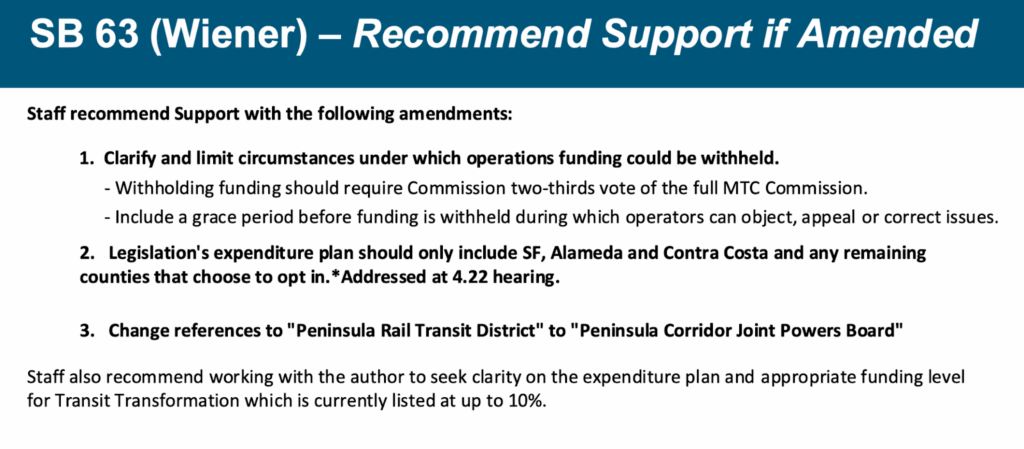On Thursday, the Caltrain board will consider taking a position in support of SB63, the authorizing legislation for a regional transportation funding measure, being authored by Senator Scott Wiener and Jesse Arreguin. The Caltrain board Advocacy and Major Projects committee recommended this position in April. SB63 was approved last week in two Senate committees.
Caltrain is requesting amendments, some of which have already been made (see slide below). The main issue is to have a clear and substantive process for when funding might be withheld, including a grace period for agencies to appeal or correct issues.
San Mateo County agencies recommend removing transit coordination – without board approval
Unfortunately, though, three San Mateo County agencies have recommended eliminating funding for the transit coordination initiatives that are bringing all-agency transit passes, free transfers, schedule coordination, and coordinated paratransit. The agencies sent a letter to Senate Transportation Committee Chairs Cortese and McNerney with proposed changes including killing funding for transit coordination. The letter was sent by SamTrans, San Mateo County Transportation Authority (the county’s transportation funding agency) and the City/County Association of Governments (C/CAG).
Shockingly, the topic of killing transit coordination had not been discussed by the SamTrans or SMCTA at any of their recent board meetings. In fact, board members and staff had repeatedly praised transit coordination, in contrast to opposition to consolidation provisions that had been included in last year’s transit funding bill. We missed covering the C/CAG board and legislation committee meeting, and will check whether this idea was discussed there.
At the same time, the San Mateo County letter also suggests having the Transportation Authorities of counties participating in the measure be in charge of distributing funds, rather than MTC, as included in the text of SB63. The bill calls for funds to be distributed by a body governed “by the same board that governs the [Metropolitan Transportation] commission.” This is the same structure used for the region’s bridge toll authority and the Bay Area Housing Finance Authority which are in charge of regional funds for specific purposes.
It is already nearly impossible for members of the public to stay on top of three separate bodies deliberating about whether and how to participate in regional transit funding, plus MTC which is already the agency overseeing of regional transit funding and coordination. It is the opposite of transparency and accountability to add a fifth body to watch.
An alternative interpretation of the San Mateo County request is that San Mateo County agencies are recommending that each county Transportation Authority meets separately to decide how to use the funding. But this breaks down when you consider that the regional funding measure will fund regional agencies, such as Caltrain and BART, and regional coordination initiatives such as free transfers. If each County Transportation Authority in five counties meets separately and make unilateral decisions, they can break systems and programs that work across counties. One agency could decide to break Caltrain, while another agency could decide unilaterally to break free transfers. That is the opposite of what voters would expect when they vote for a regional measure to maintain service for agencies and to improve coordination across agencies.
The Caltrain board will meet to discuss its position on SB63 on Thursday at its board meeting starting at 9am. The San Mateo County Transportation Authority meets on 5pm on Thursday. The letter from county agencies including SMCTA is posted in the correspondence section for the meeting.

